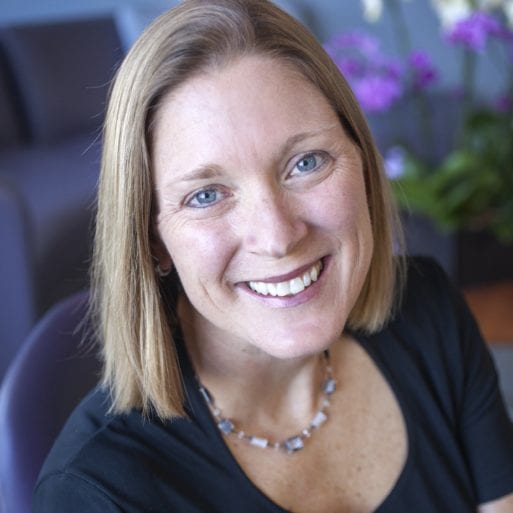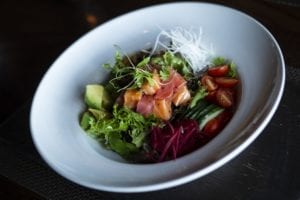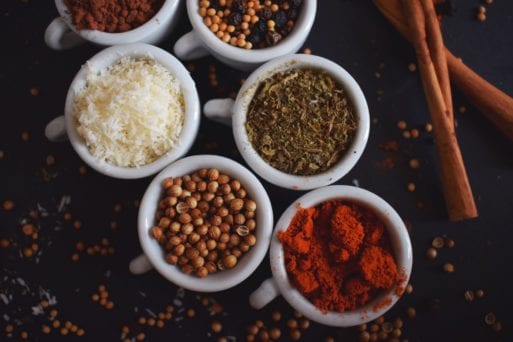
Today SevenPonds continues our conversation with Natalie Lagomarcino Ledesma, a cancer nutrition specialist who works primarily with adult cancer patients at the UCSF Helen Diller Cancer Center in San Francisco. She also works at Smith Integrative Oncology in San Francisco, where her nutrition expertise is part of a cancer treatment program that combines traditional medical practices with advanced support in Chinese medicine, integrative psychotherapy, oncology massage and body conditioning and fitness. Natalie has traveled nationwide as a consultant for the Eli Lily pharmaceutical company. She spoke about “Eating Right With Cancer” at the Academy of Oncology Nurse & Patient Navigators mid-year conference in May. A devoted mother, Natalie enjoys swimming, yoga, running and playtime with her family — and prefers to be thought of as bringing home the kale (in lieu of the bacon) from her day job.
Editor’s note: This interview has been edited for length and clarity.
Laura B. Hayden: Welcome back Natalie. Last week we looked at cancer and diet, specifically, how diet can mitigate the effects of cancer treatment. I wonder though, can diet affect whether or not we even get cancer?
Natalie Lagomarcino Ledesma: That’s certainly yet to be determined, but it is estimated that one-third of cancers in adults can possibly be influenced by diet and lifestyle. Certainly, the cause of cancer is going to be multi-factorial. Diet may play a role; environment may play a role; genomics may play a role.
Laura: What kind of effect, if any, can diet have on our cellular genome profile which, of course, could indicate a proclivity to certain cancers?
Natalie: That’s an area I find fascinating. Nutrigenomics is a relatively new concept — a whole-system philosophy that focuses on a person’s genetic makeup, biomarkers, and other clinical data to customize their diet to individual needs. Similar to precision medicine in its approach, nutrigenomics seeks to personalize nutrition.
Laura: How so?
Natalie: Instead of using our genome profile to say we are doomed to develop a certain disease, we can use it to empower ourselves with what we can learn about our genome and work proactively with it. Clearly, we need to know a lot more about this area, but we are starting to learn more and more about why, let’s say, some people have to struggle with getting ample amounts of vitamin D, or the correlation between saturated fat and weight gain. As time goes on, different factors with genomes will become much more common in our discussions about cancer and diet.
Laura: That does offer great hope for the future. In the meantime, what nutritional choices can our readers make to best protect themselves against cancer?
Natalie: People should aim to derive at least 80 percent of nutrients from plant-based sources because compounds called phytochemicals that occur naturally in plant-based foods provide protective benefits against cancer and other diseases.
My advice is to focus on loading the body with nourishing foods. A healthy plate would be half-full of fruits and vegetables in at least two meals of the day. That’s not just a slice of tomato on a hamburger but at least two cups of vegetables on a daily basis.
In addition, ask yourself — are you including a lean animal or plant protein with the vegetables? What about little bits of healthy fats — an avocado, some olive oil, some nuts and seeds — that could be spread throughout the meal?
And don’t forget ample amounts of herbs and spices — whatever you prefer: cinnamon, ginger, cayenne, garlic, turmeric. We sometimes overlook these but they are rich in antioxidants.
Laura: I like the idea of loading up on healthy food to fight cancer. What foods should we avoid?
Natalie: The connection between cancer and sugar is a really hot topic. Right now we don’t have evidence that sugar can cause cancer, but we know it is not helpful. In general, you want to limit added sugar in the diet because we do know that those who have higher glucose levels and higher IGF (insulin-like growth factor) levels do have a greater risk of breast cancer, colon cancer, lung cancer and prostate cancer. Plus, eating high amounts of sugar could influence body weight negatively, increasing the potential for diabetes, higher triglycerides, or other factors that could negatively affect one’s health. In addition, I advise my patients to eat less processed and refined foods, which in general have been linked to shorter lifespans.
Laura: Can diet help cure cancer?
Natalie: We’re not looking at diet necessarily to cure one’s cancer, but I still definitely think that diet can be of some help. First of all, a healthy diet reduces the risk of various other chronic diseases that could add to the medical issues for those who already have cancer. Second, as I talked about last week, a healthy diet enhances immune function to improve and facilitate the process of recovery through treatment. It can improve and enhance one’s quality of life. A sense of well being for anyone — cancer patient or not — certainly can be achieved by modifying one’s diet and lifestyle.
Laura: Thank you, Natalie, for sharing your expertise and sound advice.
Natalie: You’re welcome.
If you missed Part One of our discussion with Natalie Lagomarcino Ledesma please check back here.

 What is the Link Between Cancer and Diet?
What is the Link Between Cancer and Diet?




 How Dare You Die Now!
How Dare You Die Now!
 Debating Medical Aid in Dying
Debating Medical Aid in Dying
 “Help Me, Helen”
“Help Me, Helen”














